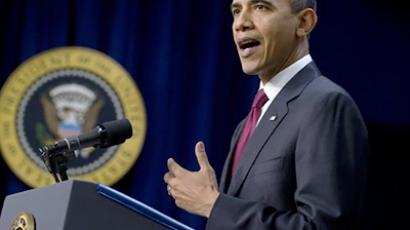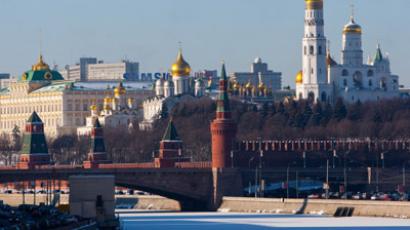Iran should ‘play by rules’ over nuclear issue
Iran should play by the rules if it wants to have legitimate access to peaceful nuclear energy, stressed General James L. Jones, former national security advisor to US President Barack Obama, in an exclusive interview with RT.
RT: There are IAEA experts who say the nuclear threat of Iran is not what it used to be, and if they abide by the law, Iran should have a peaceful nuclear program. How can we move forward without encouraging double standards?General James L. Jones: We always said that Iran should have access to peaceful nuclear power if it wishes. We offered to replace fuel in medical reactors in Tehran. It is not an issue of peaceful nuclear power.Iran has declared rather openly what it would do [to its neighbors] if it became a nuclear power.If Iran seriously wants to play according to the game rules, we all play and sign documents that guarantee certain behavior, there is no reason why Iran should not have nuclear power for peaceful use.The pressure and responsibility is not upon Russia or the US to make Iran do anything that it does not want to do. It is up to Iran to say: we do not want to be like North Korea ten years from now, living in a world of isolation.That is a great civilization and great people. We happen to know that the Iranian people want more freedom. They look upon the west and countries outside their borders as inspiration, they see the freedom of our societies and they want to live like that.They are going to figure out how they can get that a little bit more, but as far as the nuclear question goes, both Russia and the US have sent signals to Iran that there is a perfectly reasonable pathway that preserves their dignity and their respect to get to peaceful use of nuclear power. So it is really up to them.RT:There is a lot of talk [in the US] about the threat of Iran. As you see it, how real is this threat?JJ: Iran does represent a subject matter where the US and Russia work very well together. Russia did some great things by canceling the sale of the S-300 (surface-to-air missile system). The US should in many instances be sensitive to Russian concerns in sharing vital information so we’re able to come to a point where we really have a pretty good understanding of what the threat was in terms of the Iranian nuclear program.If you look at Iran and its behavior today, to me it’s a sign of a regime that is really feeling the pinch of global isolation. The Russian support for the sanctions regime was vital.It is positive that now Iran talks about rejoining the talks with the IAEA. I think that the policies we worked together on [with Russia] two years ago are now showing some possible fruits in terms of the behavior [of Iran].We get to these positions by working together; we get to these positions by trusting each other; we get to these positions by sharing information. I think Iran is one area where we have done some good work.RT: What are the top priorities of US-Russia global security cooperation?JJ: The Russia-US bilateral relationship is one of the most important relationships on the planet today.One of the things I was privileged to do in the White House was working on the famous reset of the relationship [with Russia].It was manifest of the personal relationship of the two presidents and it resulted in that spirit of working together and developing trust and confidence that resulted in the START treaty. It resulted in two countries looking at the same problem through a much more common lens than perhaps ever before. It is not only very important – it is crucial.RT: Progress in the Russia-US relationship is being held back by the differences on missile defense. How do you see that moving forward?JJ: In my view, on missile defense we have made some concessions.There are people still living in another century, in the Cold War, Russians and us against [each other]. It is not the case, I don’t believe it is the case. I don’t know anybody who is a serious thinker in my former profession that is military, who thinks Russia is the enemy. We think it is a lot better for Russia and the US to find common ground and missile defense is one of those areas where we should work very hard with the rest of the Europeans to find a solution.I’m a big believer in military to military training and participation.We can bridge a lot of those gaps and we must leave the 20th century to rest in peace as we move forward in this very complex 21st century to do things together.RT: With the cooperation, why has the US been reluctant to give Russia written guarantees that any kind of system in Eastern Europe would not be against Russia?JJ: I’m not part of those negotiations so I don’t know.I do not think among friends and trusted allies anything should be insurmountable unless it is something fundamentally against the security of each individual nation – which nobody wants to see happen.Reflect how far we have come since January 2009. I was really proud and encouraged by that.We both [Russia and the US] have national [presidential] elections. We both are going through the throws of the inward focus, when you have a national election. When we both come out from those elections, my guess is we will get back on doing the good things we were doing just a year ago.














